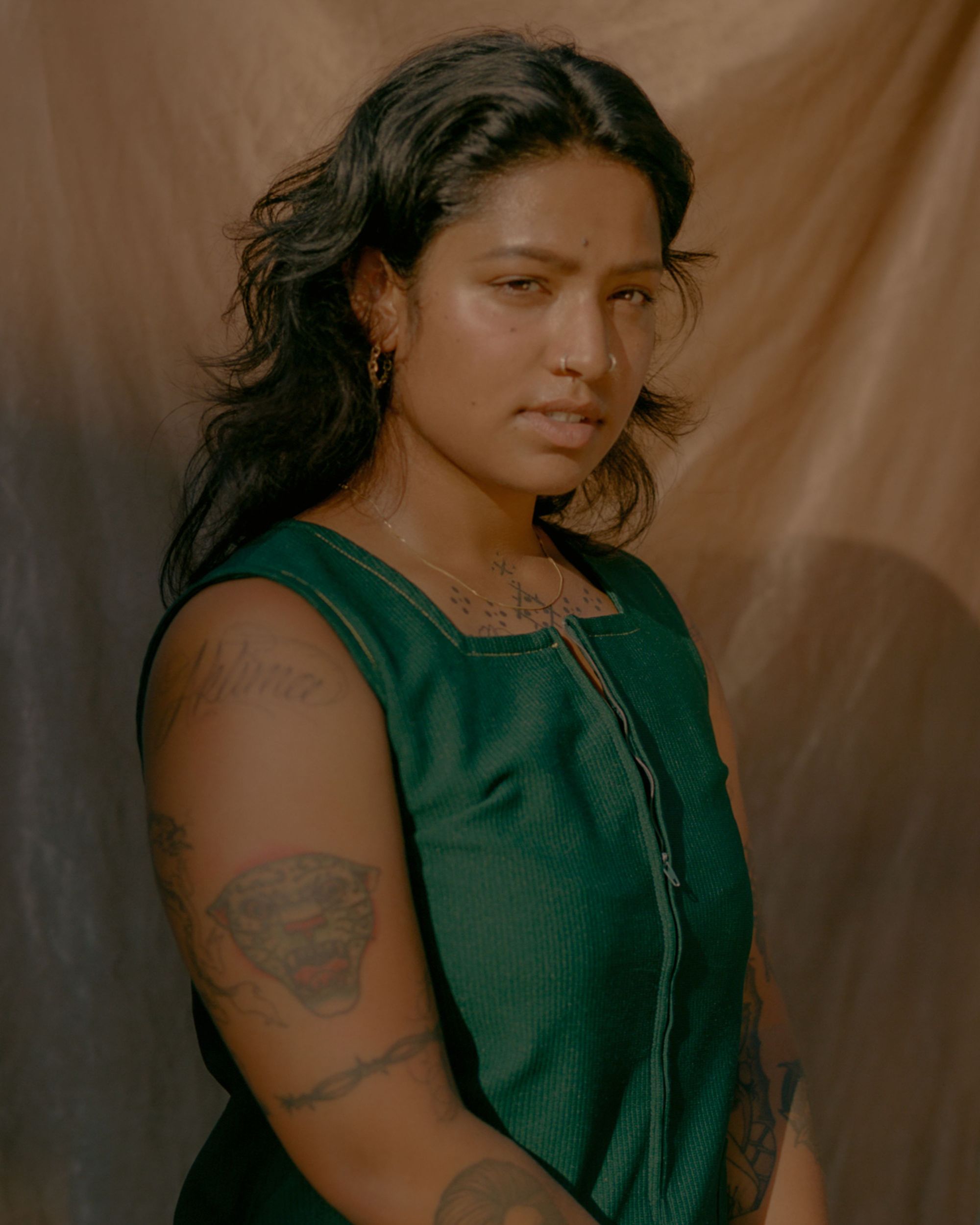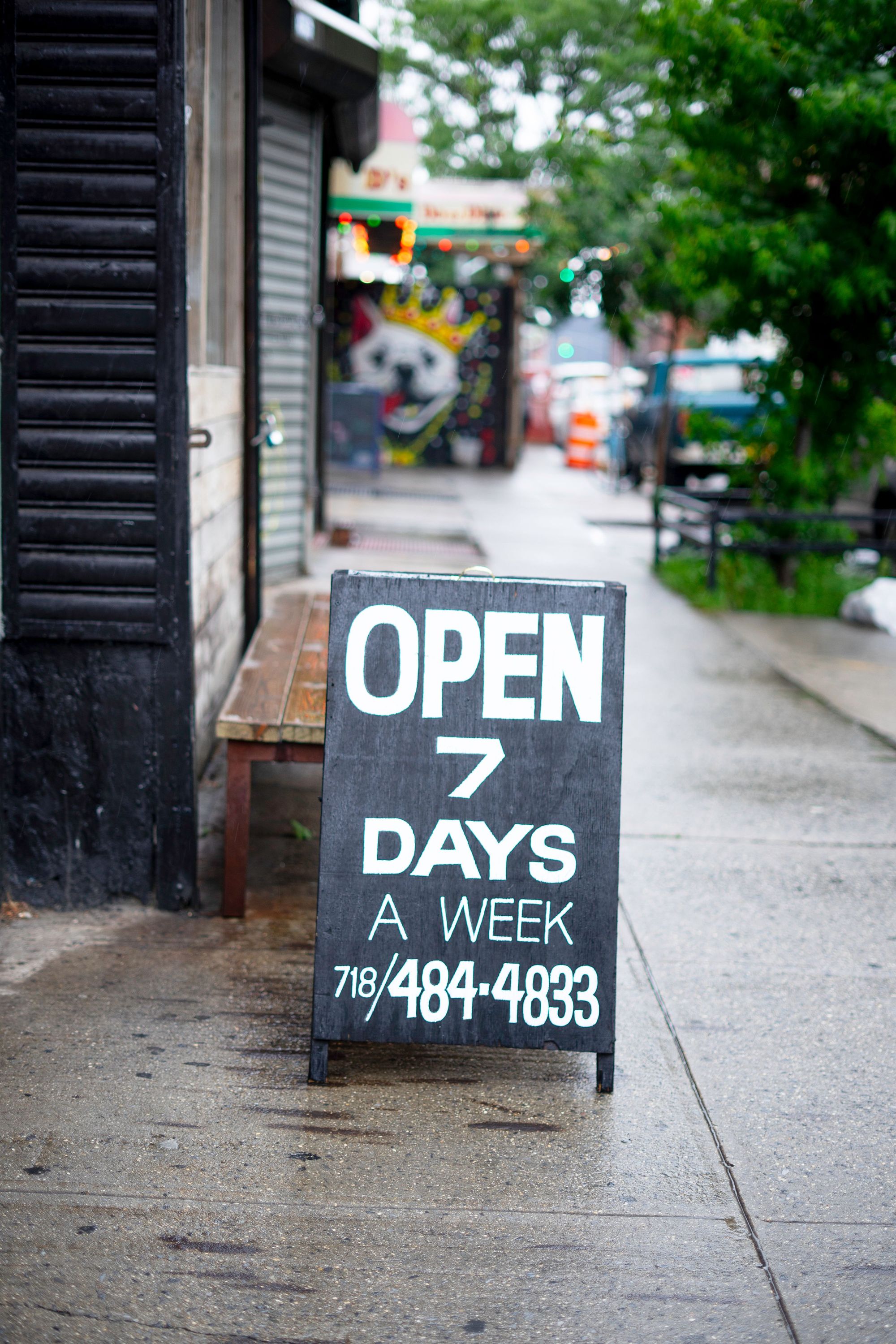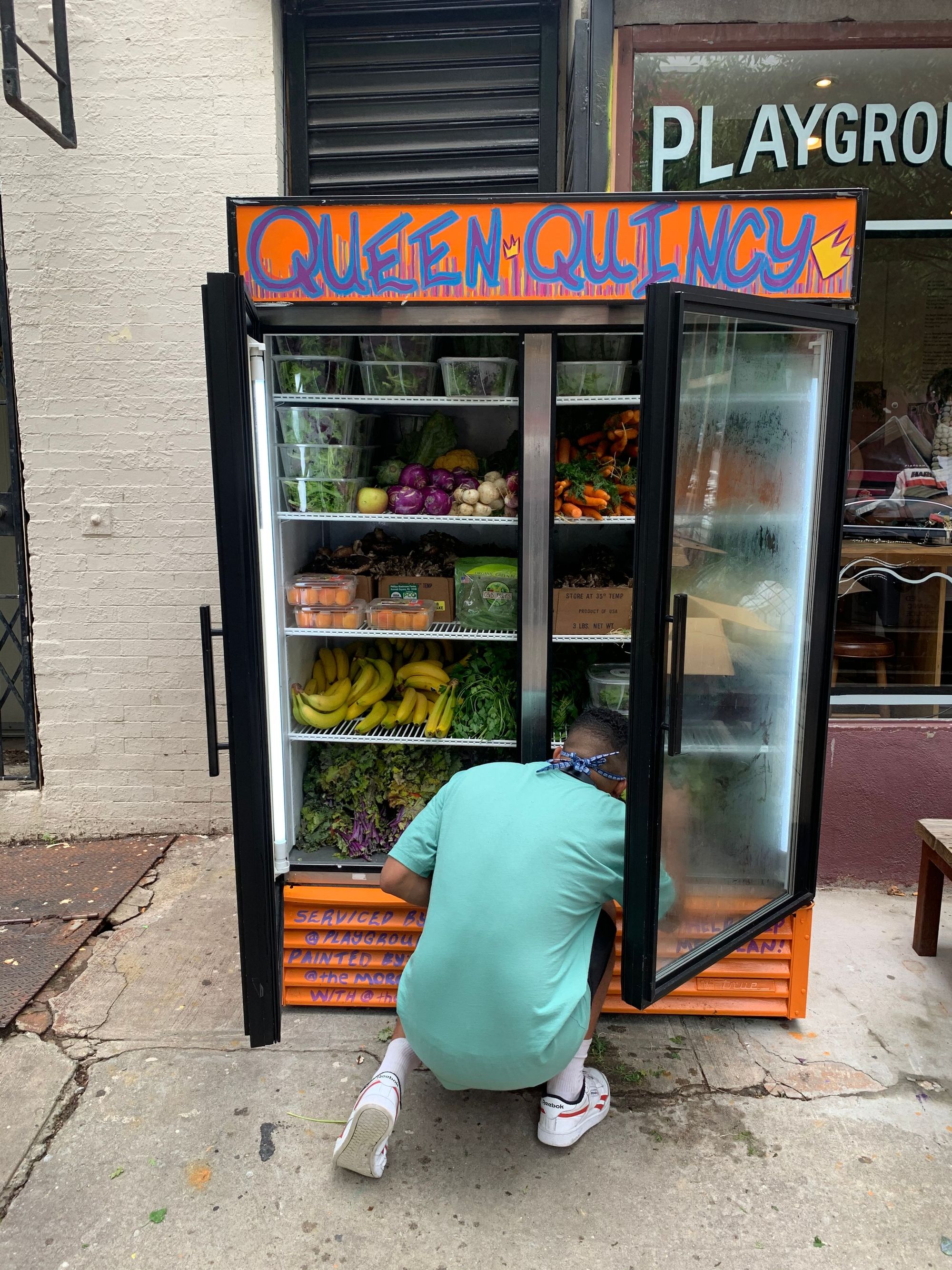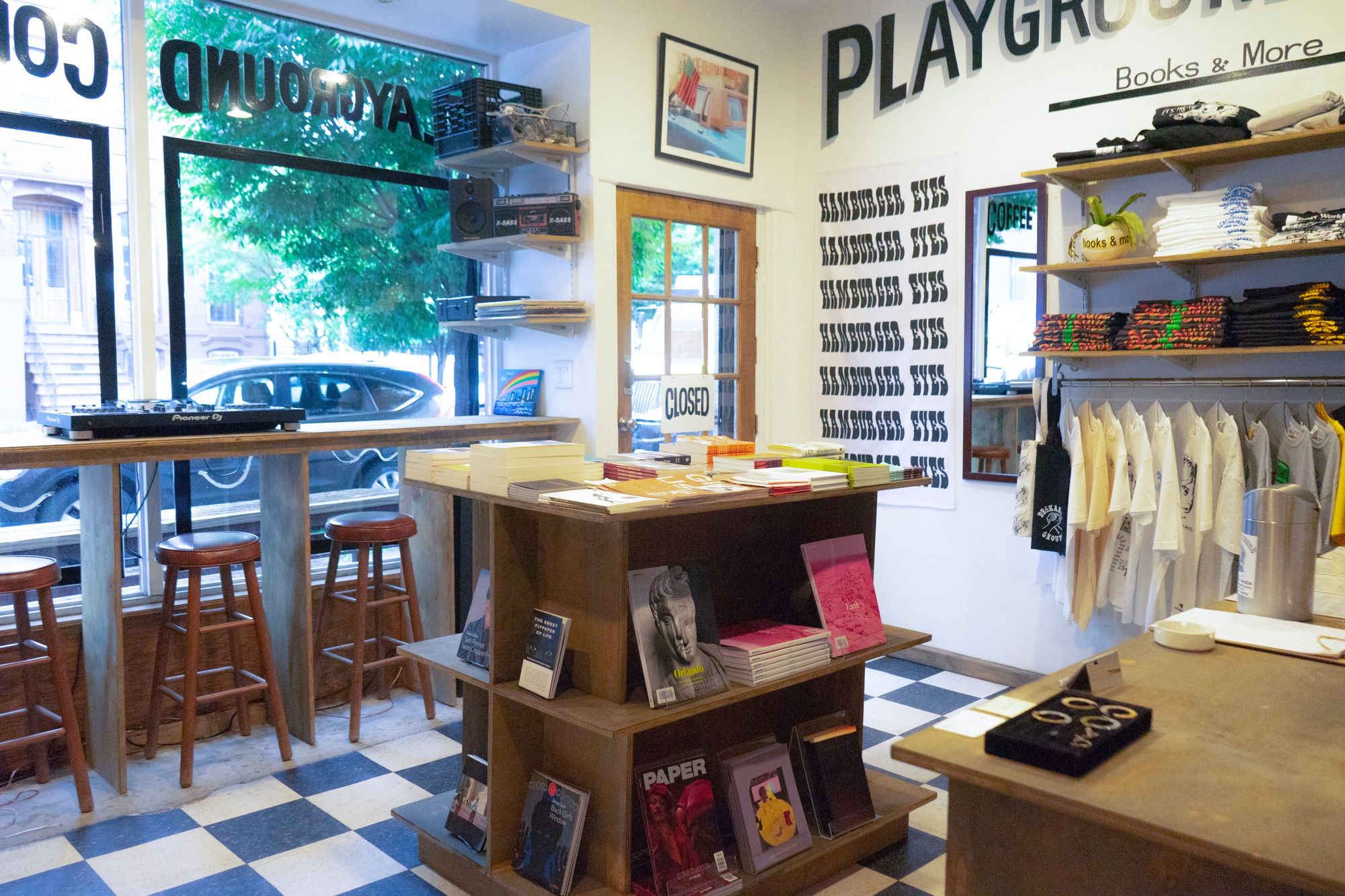How to Make Mutual-Aid Work Sustainable
This interview inaugurates Strange Futures, a partnership with The Strange Foundation to highlight how artists and organizers are seeding transformation in this moment. Here, Willa Koerner, Director of The Strange, caught up with Zenat Begum, a community organizer and owner of Playground Coffee, located in the Bed-Stuy neighborhood of Brooklyn, NY.
How did you start Playground Coffee, and what goals did you have in mind?
Playground Coffee Shop opened in 2016 with the purpose of creating space for Black and Brown folks within the coffee industry, and to offer resources and skill-sharing opportunities to people in the neighborhood. The latter part of our mission opened up more opportunities for us to expand what Playground could be. In the last four years, we've been able to start a radio station, and a food program called Playground Eats, through which we provide sliding-scale or free meals. And recently, we started a community fridge initiative and a take-one, leave-one lending library that provides scholarly literature and radical texts written by POC and queer-identifying folks.
We also do a ton of programming through our 501(c)(3), Playground Youth. The non-profit is how we're able to facilitate things like art fairs, defense training, financial literacy workshops, healing circles, and hosting AA groups.
So ultimately, Playground Coffee is a community hub for people to get more of what they need, and it’s a safe space. We honor the folks that come in by protecting them as much as we can, and by trying to help people with whatever projects or programming they want to start.
It’s great that while you’re doing so many different kinds of things, the coffee shop is the anchor that ties it all together. Why did a coffee shop feel like the right kind of venue for the work you do?
When I was in college at The New School, I had a really hard time paying attention. I would study at coffee shops as an alternative to libraries, right? And whenever I'd go to a coffee shop I knew I'd meet really cool people. But eventually I realized that the coffee industry was generally not supportive of a person who looked like me, because they didn’t tend to employ people like me.
Then when I came back to New York in 2013, I started meeting a lot of amazing people who were running these very cool community spaces, but a lot of them were white-owned. This became an issue that I really wanted to combat, so my friends and I had the idea of creating our own space. Around the same time, my father's hardware store—which is the Bed-Stuy space that we're in now—became available to us. The idea of starting a coffee shop where people could meet around food just clicked for me.
At that point, I drank enough coffee and knew enough about it where I was like, “I can do this.” And so Playground was born, and before I knew it, it’s become everything but a coffee shop. [Laughs] Sometimes I even forget it is a coffee shop, to be honest. I think it's almost ironic to call it a coffee shop, but in the most perfect way.

The idea of a coffee shop just feels magnetic and comfortable. Anyone can belong in that kind of a space, and in that way it kind of takes the pressure off. If you had created an art space or something instead, it would feel different.
Yeah. Also, as we move away from the normal idea of what it is to be in a restaurant, things have to be multidimensional in order for them to work. In New York, especially now, when something is just offering one singular service, it can lose a lot of its impact. The idea of Playground is that of a hybrid organization running a hybrid space within a multidimensional world.
Even as myself, I have a hard time explaining who I am, or fitting myself into a box. Similarly with Playground, I want people to take different things away from it depending on what they need. It could be a coffee shop to some people, and it could be a community center or a healing space to other folks. But either way, you're going to walk out with something, right? The entry point, or points of access to get in—it’s almost like it doesn’t matter how you end up here, but once you’re here, you're going to see all of the dimensions of what we’re doing.
Since you do so many different things, is it hard to know what to prioritize? How do you decide what to take on?
Our mission statement has always been about giving access to resources that we have within our own network. Essentially we are a knowledge platform, so we exchange knowledge and provide skill-sharing opportunities. Beyond that, we’ve always been committed to empowering Black and Brown folks. I think the ambiguousness in what to take on can come with programming decisions, but who we intend to serve has always been concrete—it's always been to prioritize as many Black and Brown folks as possible, because we are not a priority anywhere else.

As someone who’s always been focused on mutual-aid work—and as someone who, for the past few months, has been stocking fridges filled with free food for people in the neighborhood—what do you think it would take to keep these kinds of mutual-aid programs going, even after the pandemic is over?
To all non-Black people, I want to say that it is our right to fight for what we expect our society to provide to all humans—which is the right to have housing, social support, healthy food, and healthcare—and we need to be as persistent as possible. Because who knows what’s going to happen next. People could get their jobs back, and then they could start to care less, and that could ultimately be the end to this movement. Life is a distraction. Our jobs are a distraction from what's going on.
Overall, I think capitalism is the biggest distraction. Capitalism is always going to manipulate itself to take a different form, or present itself to us differently so we think we've changed our ways. But ultimately, capitalism evolves just like a virus. We need to gain new antibodies to fight it off every time.
Why did it take a pandemic for people to realize that we were in shambles already? The idea that we're not living in a consistently alarming and scary world every day is what gaslights Black and Brown folks. Playground exists because we know we will never be able to thrive in a world that wasn't made to support us. I think the pandemic has opened everybody's eyes to everything that’s broken because we've just been home. And naturally when you're home, you notice stuff. You fix things that need to get fixed, and you look at things in a more nuanced way.
For me, during COVID was one of the first times I've actually gotten a real break from the last four years of doing Playground. And so I started noticing things that were wrong with my life. In a similar way, there has seemed to be a kind of universal feeling of panic taking hold during this pandemic. When people panic, we need to do things for ourselves that nobody else is going to do for us. It becomes a form of survival. We have to look out for ourselves, and ultimately, mutual-aid is one of the best ways we can do this.
But in terms of mutual-aid work, I also think that a lot of the people who have taken it on themselves to try to organize have been white people. And as much as those people want to help, there still need to be Black and Brown people at the forefront of the revolution. So I think it becomes an issue of, where do white people sit? Where do white people stand in a post-COVID world, especially within mutual-aid work? From my perspective, it’s about deflecting the attention and actually giving it to folks who need it, and who are spearheading change. We don't need another white leader to spearhead this change for us. It's going to have to come from Black and Brown people as sincerely as possible.
At Playground, to stay true to our mission, any time we do anything we want to make sure people have the tools to do it themselves, too. None of the stuff we're doing is necessarily hard—it's just about organization, and about giving ourselves time to make it happen. During COVID, we have time to cement these ideas into our everyday practices, so that mutual-aid work becomes part of our lives. We all need to become people who don’t take on mutual-aid work as individual tasks, but instead make it part of our ongoing work.
Often, I’ll see my own friends, who make below minimum wage, redistributing their wealth. Similarly, that's how we've been stocking our fridges—by donations. When we made the first call it was literally just everybody in our community giving us money so we could stock the fridges. Now it's been over 45 days since we've been stocking all the fridges, and it's a part of our everyday systems. I get up, and I fill the fridge. Or, I get up and I promote the donations page for this work. But either way, I am committed to the work long-term.
My last thought on this sustainability question is this: Once COVID isn't an issue for us anymore, systematic racism will be, as it always is. And if we don't get it right this time, we're going to have to keep doing this forever. So hopefully we can set a system up that is exemplary, and then one day our public officials will see the need for this kind of community support long-term, and actually create programs for marginalized communities to get what they need.

What kinds of tactics are useful to help get people into that organized mindset of just committing to mutual-aid practices, and making it a part of their life long-term?
With a lot of mutual-aid work, I feel like there has to be this larger discussion around the driving force behind it. Like, why do you want to start a mutual-aid organization now? If people can't properly answer why they're doing something, chances are they are just trying to hop on the bandwagon, because it's the safest thing to do. And that’s not sustainable.
As far as being able to make community support and mutual-aid systemic, we already have the resources to figure this out. We have books that are literally written about this. bell hooks talks about this. Angela Davis and Toni Morrison and Zora Neale Hurston talk about this. There are so many prolific Black authors who do the work for us every day, and I think it’s sheer ignorance that prevents us from taking their words to heart. That could be a result of privilege, where some people think they are above these texts and these narratives, because it doesn't affect them. It’s just like how a lot of people don't think capitalism is shitty, because it doesn't affect them negatively.
So, how do we get these people who live in this bubble to see that it does affect them? I'm not sure. I think the only thing we can do is hope that by and by, our work changes the way people think. I'm not going to say I've done exemplary work, but I have put in the time, and every day when I wake up, I do it better. That's what persistence is—that your existence is literally a protest and an ongoing resistance movement, you know?
There was a point in April where I was consistently depressed looking at the news, because I’ve honestly been hearing the same tragic stories my whole life. People getting sick. People being murdered, or brutally silenced by the government. All those things happen every day, not just during COVID. But I realized that instead of feeling upset about it, as a person who is able-bodied and has a lot of privilege, I'm able to do something about it every day.
It’s important that we each think of ourselves as part of the revolution, with an active role to play. Personally, I'm an activator, so I'm able to organize directly. There are other people who can make graphics to spread information, and there are people with monetary wealth who are able to donate, and there are other folks who can go out and protest. Either way, we need to fill all the roles for the revolution so we can finally rewrite our history.
How do you personally juggle it all? There’s just so much to do.
It is a lot. But that's what I took on when I opened Playground. I personally don't see any other place like it anywhere else in the world right now, and that’s something I can say that with my chest held high, because I’ve done the research.
I really do feel that the impact the shop has had on the world so far has been astronomical. I ground myself every day in that knowledge, and in the fact that this work is rippling out far beyond me. But I do also need to make sure I'm taking care of myself. These last four months I was classified as an essential worker, which was bizarre. I sell coffee. Like, here we are, giving these titles to people who don't necessarily want them. I was very scared of getting COVID, and of not being the person who was being waited on, but rather being the person waiting on someone else. That took a lot of my energy away, and I think when I started to realize that, that's when we started doing our community work, and I started figuring out how to balance things out for myself.
Related to balance: Every time I have an idea, I try to make extra space for it, because I know the task at hand is going to be really loaded and intense. This kind of organizing work can be made easier if you have like-minded folks working with you, but still, it can be a lot. So overall, I'm taking it day by day, because it's the only thing I can do. Hopefully I can draw more routines into my self-care days, so I can get even better at doing my job. And centering myself, obviously. [Laughs]

Can you recommend some action items for people reading this interview? What can they do to help?
For the first time in Playground’s history, I'm fundraising on its behalf, because unfortunately these PPP loans aren’t actually being granted to small businesses. Instead they’re going to organizations like the NBA or, I don't know, smaller businesses that are owned by celebrities? It's just bizarre. Anyway, we're committing ourselves to raising $100,000 in the next six months to ensure that Playground can exist after this COVID pandemic.
You can also donate books to our take-one, leave-one library—as long as they fit into our mission of prioritizing Black, Brown, and queer authors. And with our fridges, we are accepting produce at all times, because the biggest challenge right now is keeping the fridges full. If you have food to donate, you can just drop by and put it in the fridge. (Fridges can be found outside of Playground Coffee at 1114 Bedford Avenue in Bed-Stuy, in front of Sincerely Tommy on Tompkins Avenue in Bed-Stuy, and at Yafa Cafe on 4th Avenue in Sunset Park.)
Lastly, we're always looking for new organizations to work with so that we can keep everything going. The work doesn't stop here, and we sure can't do it alone. The more, the merrier.
To learn more about Playground Coffee, follow them on Instagram. You can also follow Zenat on Instagram, or contribute to Playground’s GoFundMe.
Subscribe to Broadcast